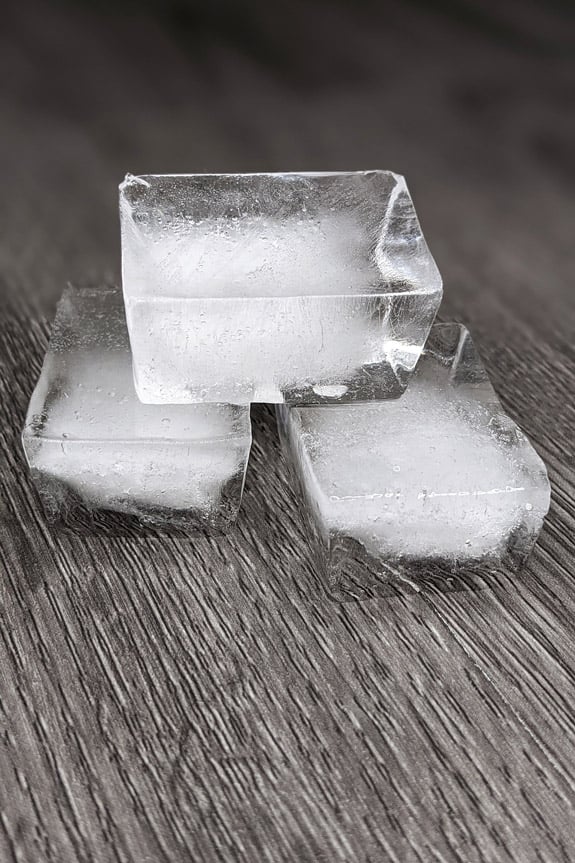In most cases, if you want to, you absolutely can water your houseplants with ice cubes. But, you probably don't need to. It can be a hassle setting it all up and could damage certain indoor plants in the long term.
That's the simple answer.
The rest of this article looks at the issues surrounding this interesting watering technique hack. Read on so you can decide if using ice cubes is right for you (and your plant!).
The ice cube method of watering can prevent too much water from surrounding the roots of houseplants.
The main reason people use ice cubes to water their plants is that it helps them get the right amount of water to their houseplants in a controlled and measured way.
We get it. You've just got a brand new plant and you want to care for it properly. If you spend even half an hour reading about Plant Care 101, you'll know that overwatering can be a big problem.
Further reading -
Are you overwatering your plants? - The Signs to look out for
So the ice cube trick is a simple solution that provides a safe way to prevent overwatering, by stopping excess water from gathering around the roots. This helps keep root rot away and your plants healthy and happy.
In principle, it does work. The ice melts, turning into water which then gently soaks into the growing medium and delivers moisture directly to the plant's roots at a steady pace so they get enough water.
Understandably, you may be worried about the use of ice cubes and the effects of cold water, especially on sensitive plants.
Ohio State University experimented with using ice cubes to water orchids and concluded that the practice had “no detrimental effects” on the health of the plants.
There are even companies selling a range of houseplants with the tag line "Just add Ice." Instructing you to add a certain number of ice cubes to the top of the soil every week.
In reality though, using a fixed way to water your plants will give varied results. Nicole from Sunnysideup ran her own five month experiment using the "Just add Ice" instructions and you can see how she got on below.
Nicole from Sunnysideup runs her own experiments to see if this is the best way to water houseplants.
The conclusions Nicole finds mirror our own experiences. Yes, ice cubes as a form of regular watering provide a measured way to water your houseplants, and it does work. But you have to adapt it to the needs of your plants.
Plants in your home will never perform long term if you attempt to use fixed and ridged ways of looking after them.
Every home is different and every plant will have different needs. For example, an Orchid in a large container growing in a warm room is going to need much more water than a smaller plant in winter.
Using ice cubes to water plants does work, but using a set amount each and every week won't.
Okay. So you're sold on the idea or maybe you're intrigued and want to know when using ice cubes instead of reaching for the watering can is a good idea. Let's look at some good times to use ice and why it can be helpful.
Large ice cubes can hold a lot of water and, once fully melted, could give your plant a thorough watering.

Hi, I'm Tom!
If you're like me and enjoy the challenge of growing houseplants and getting them to thrive, then Ourhouseplants can help. This website shares my knowledge and years of growing plants and provides (hopefully) helpful advice on properly caring for your indoor plant friends.
There are some occasions where we wouldn't recommend using ice cubes around the base of your plant.
Cold temperatures caused by the ice being in direct contact, could negatively effect the health of the plant.
The Ohio State University study we linked to earlier as well as hundreds of people's anecdotal stories on Social Media, like users on Instagram and Reddit, agree with my personal experience: There has been no (obvious) negative effects from using ice cubes as a way to water houseplants.
How do I water Moth Orchids?
During routine watering maintenance of Orchids I'll simply run the entire plant under the tap for a minute or two over the sink.
If the potting mix is completely dry I'll soak the pot in a bowl of water for five minutes.
But when there is a discussion about it, someone will always point out that surely it's a hassle and involves extra steps to freeze the water in the first place. I couldn't agree more.
This is primarily why I'll only use ice cubes very occasionally, such as when it's advantageous to do so.
In the majority of cases, I'll just follow the "traditional way" by using a watering can with room temperature water. I'd recommend this to all plant parents because it's reliable and ultimately a better and easier way to get the job done.
If you disagree or have a different take on the matter, let me know below.


